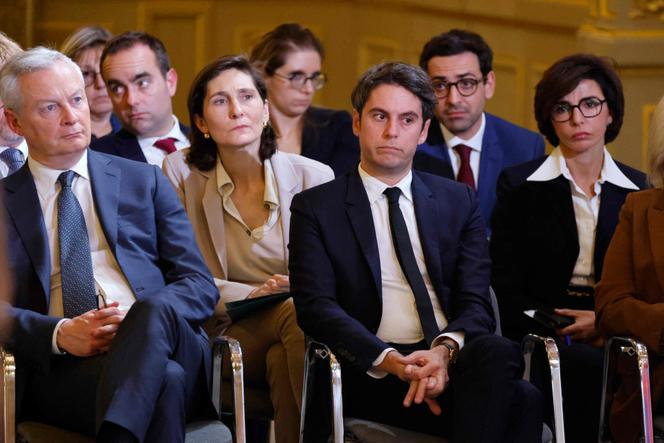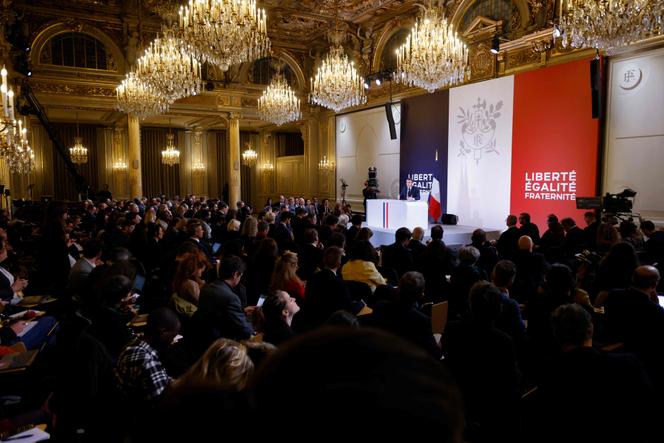


President Emmanuel Macron on Tuesday, January 16, sought to breathe new life into his final term in power with a promise for a "stronger and fairer" France at a rare news conference. With concerns over education riding high in France, Macron's comments were peppered with promises to improve civic responsibility among young people and crack down on radicalism.
"I am convinced that we have the basis to succeed," said Macron, telling reporters gathered under the chandeliers of the Elysée Palace "our children will live better tomorrow, than we live today." Watched by his new cabinet team, Macron announced what he described as a "civic rearmament", saying that "every generation of French people must learn what the Republic means."
He announced a trial that could lead to school uniform becoming compulsory in the next two years, said all children should learn France's national anthem La Marseillaise and also unveiled an idea for all schoolchildren to take drama courses.
"France will be stronger... if we are more united, if we re-learn to share values, a common culture, respect in classroom, in the street, in public transport and in shops," he said.
Entering even into the daily lives of families, he announced that he wanted to "regulate the use of screens among young children", although it was not immediately clear how this would be implemented.
Macron also promised order, by "better controlling our borders, by fighting against uncivilized behavior with a doubling of the police presence in our streets, by fighting against drugs, by fighting against radical Islam."
The president announced a school uniform trial at around 100 educational institutions with a view to making the measure compulsory nationwide if it is successful. "School uniforms – which erase inequality between families and at the same time create conditions for respect – will be tried out from this year in around 100 schools on a volunteer basis," he told journalists.
If the experiment shows positive results, the measure will be implemented nationwide in 2026, he told the news conference aimed at turning around his second term in office. Uniforms have never been compulsory in all state schools in mainland France. First Lady Brigitte Macron, a former drama teacher, has backed the introduction of school uniforms.
"France will be stronger... if we are more united, if we re-learn to share values, a common culture, respect in classroom, in the street, in public transport and in shops," he said, stressing the importance of education. "Every generation of French people must learn what the republic means," Macron added, pledging twice as much civic education in schools from the new academic year.
He said he would be in favor of ensuring all children learn the French national anthem, La Marseillaise, from primary school.
The president said he hoped to make drama mandatory in school from next September "because it creates confidence, teaches public speaking and contact with great texts."
He also said government would lay out measures to "determine the good use of screens for our children" for "the future of our societies and our democracies."
Macron's comments come after Gabriel Attal, 34, became France's youngest-ever prime minister last week, after just months as education minister. During that time, he tackled bullying, including with a video featuring France's national football team, and banned pupils in public schools from wearing the abaya, a loose-fitting garment worn by Muslim women. Attal's successor, new Education Minister Amélie Oudéa-Castéra, has come under fire over her decision to have her children attend a private school.

The press conference at the Elysée Palace on Tuesday was the first such question-and-answer session hosted by Macron in France for almost five years. The president regularly answers questions from reporters while abroad but has made a habit of almost never holding a full-scale press conference at home. Instead, Macron has preferred to communicate through videos and posts on social media, as well as formal addresses to the nation at times of acute domestic or international crisis.
But Macron is hoping to breathe new life into a second term in office hobbled by the lack of a parliamentary majority, after mass protests against a pensions reform and divisions within his ranks over an immigration bill last year. The president tilted his cabinet slightly to the right last week, just months ahead of European elections in June in which the far-right Rassemblement National (RN) looks set to beat his Renaissance party.

Macron has called for the revamped ministerial team led by Attal to be "revolutionary", and bring back the spirit of bold change from when he was first elected in 2017. But critics have pointed to a lack of women in mostly unchanged top ministerial posts and questioned priorities after the education and labor briefs were relegated to ministries with other responsibilities.
The last time Macron opened himself up to questions from journalists in such a way was at a press conference in April 2019, after the so-called Yellow Vests revolt – initially against a proposed hike in fuel tax that was later scrapped – that was a major challenge to his first term. He spoke to journalists for four hours in 2022, but that was to campaign for re-election.
Macron promised to speak to the nation after Parliament passed the controversial immigration law in December, after it was hardened under pressure from the right. The president has said he believed elements of the law were unconstitutional, and the Constitutional Council is to rule on the legality of the legislation on January 25.
Macron accused the far-right RN of being the "party of collective impoverishment" and "of lies." He said: "I am pleased to have been able to prevent this operation [by defeating the far right in the previous 2022 presidential election] and I will do everything to continue this because it is good for the country."
